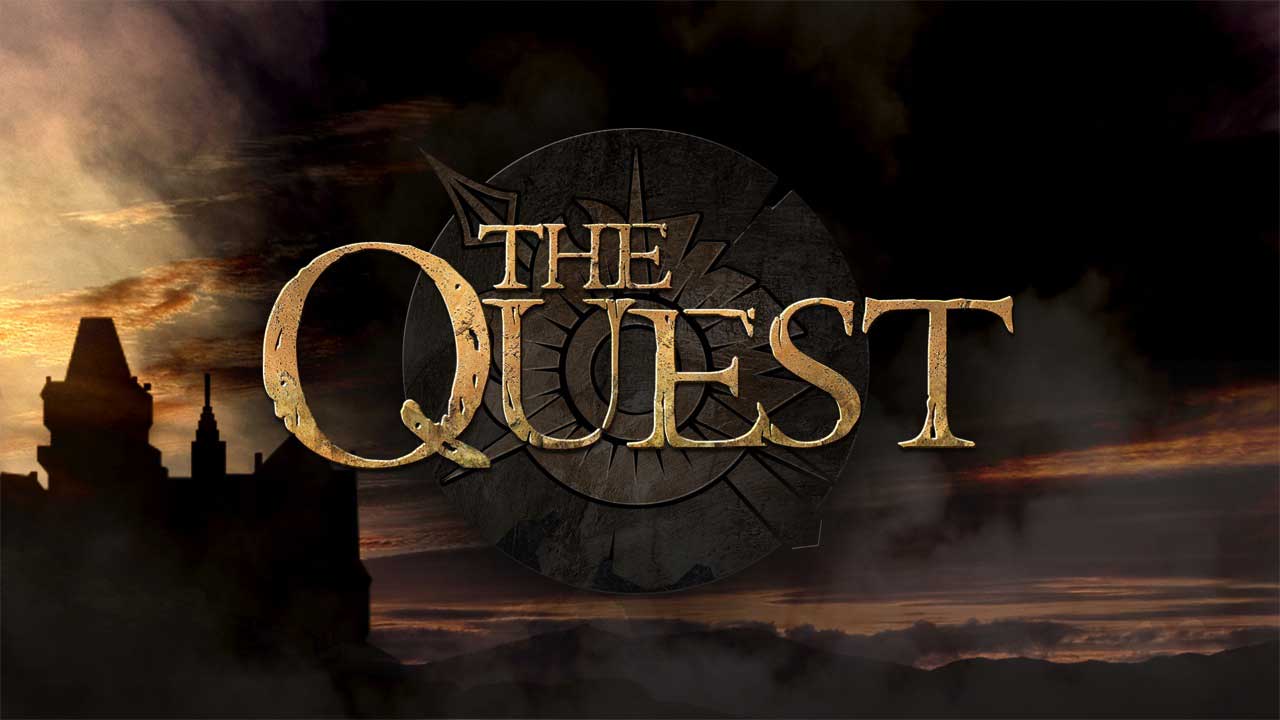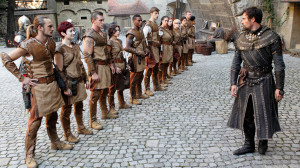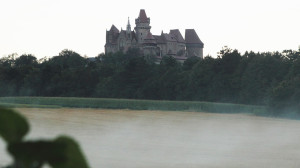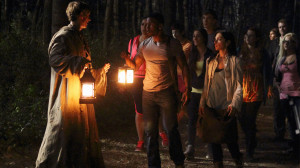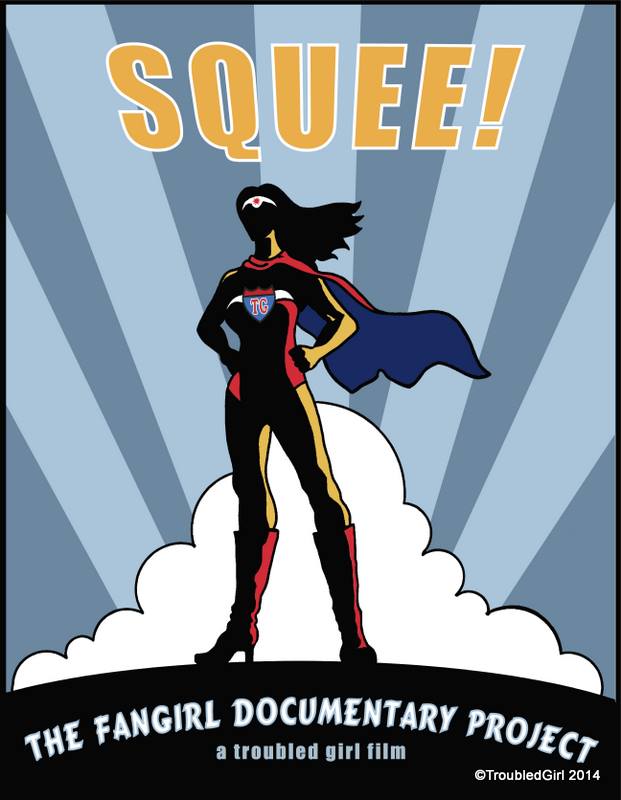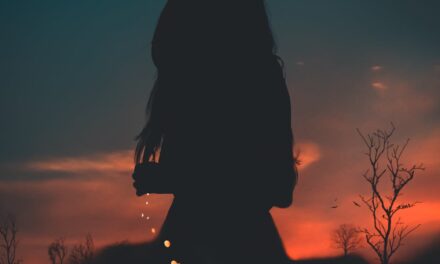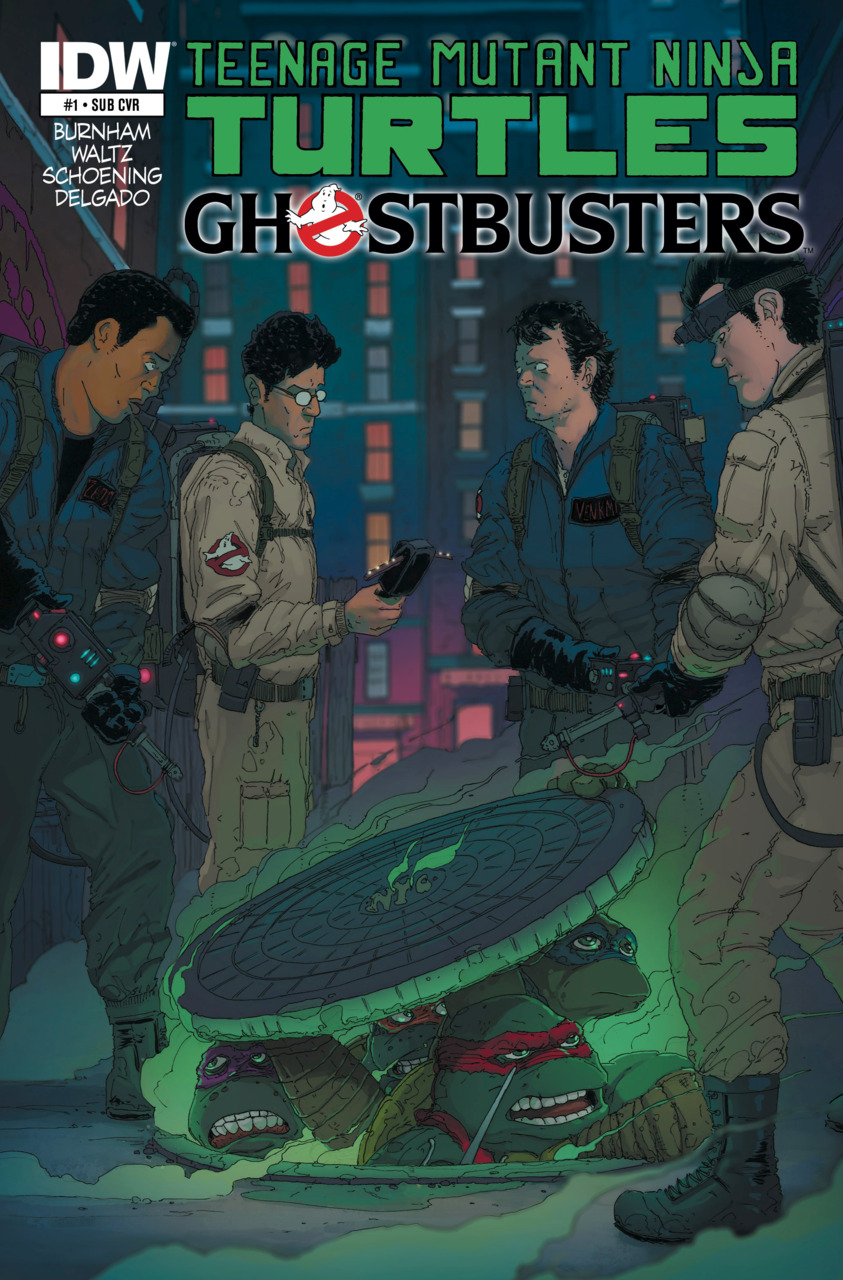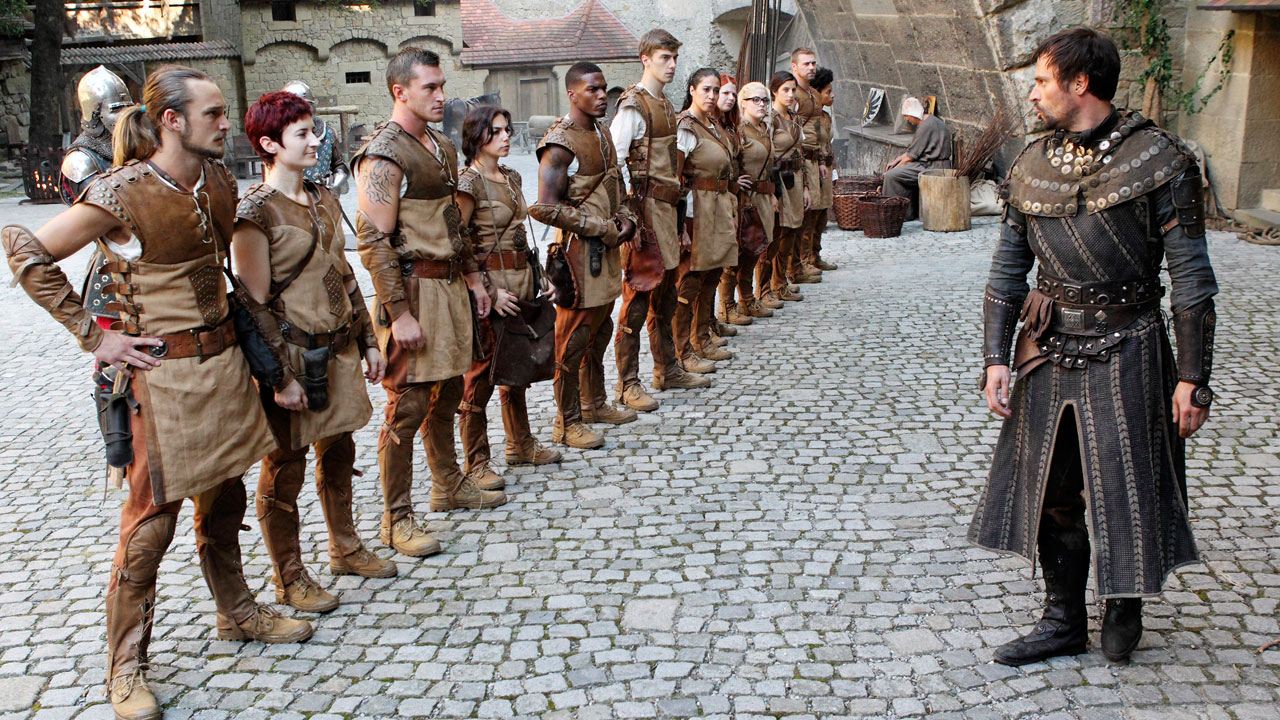by Contributor Tina Degenhart
and Senior Editor Tara M. Clapper
By now you’ve probably heard about “The Quest,” an exciting series premiering this Thursday, July 31 at 8 PM ET.
This fantasy adventure show includes a hefty dose of reality as the participants portray themselves in a fictional world complete with challenges, puzzles, obstacles, and you guessed it – quests.
Since the first season’s audition process, some members of the geek community have expressed reluctance to accept the show’s premise. After all, LARPers (live action role players) have been courted, represented, and misrepresented by producers at a consistently increasing rate in the last several years.
As members of this community, we felt that it was necessary to not only learn about the show and its obvious ability to simultaneously appeal to the hardcore geeks and the mainstream, but to ask about how it represents the participants – in this case known as paladins. Given the mission of our site, we were also interested in learning about how the female paladins are represented on the show. By the way, there are seven of them competing against (or working with) five male paladins.
“The Quest” Executive Producers Rob Eric and Mark Ordesky answered our concerns and informed us about the show during a recent phone interview.
TARA M. CLAPPER: What is the tone of your show? Is it more epic and serious or is it more a campy feel?
ROB ERIC: When we sort of conceived this show, we put together a trailer – and this is five years ago – and we said, okay here’s this trailer. Here’s what we want the show to look like, this is what we want to feel and this is the tone we want. We used different pieces because of course Mark was Executive Producer of “Lord of the Rings,” so we used “Lord of the Rings,” “Stardust,” and “Harry Potter,” and pieces we were big fans that we were part of our sort of fandom.
If we could create a show where we could put people into a world that we would want to be in, what would that show look like? And so that was sort of the seed of how we created the world, and so it took a very serious tone… it has very structured and layered mythology. [As it was a] fantasy kind of show, we took a very serious tone to it and the point of the show was to find one of these twelve paladins becomes a true hero.
So that journey is the same journey we would do if we were writing a fantasy movie. You know they’d have to get from point A to point B and in all of that you want transformation of character; you want transformation of themselves. So we took a very serious tone to it.
MARK ORDESKY: The fundamental seed of the show is these twelve contestants, these paladins, can act completely themselves and have this world impact them. So everything from the costumes to conception to design…everything is natural. And obviously… there are moments of humor and there are moments of high drama. So we really needed it to be an immersive environment. Rob Eric sort of coined this term ‘immersive reality’ and that’s a good way to sum it up. Because there’s a full spectrum of moments so no, it’s not a campy, make-fun-of-people-sort of tone at all.
ROB: We did a thing actually; we were invited by Wikia to go on the super fan train to Comic Con.
MARK: The Wikia Fan Express.
ROB: And we were asked to show the show and to give a sneak peek of “The Quest.” And you could tell very early on we knew that this was going to be part of an issue because I know that there are other shows out there, I know one in particular that people were not very happy with, because it sort of made fun of and exposed the community in a bad way. So we get on the train and we were just starting and that was one of the first questions that came up and there were a lot of arms crossed and a lot of sneers over at us. And by the time we got done with just the explanation without even having to show the show, people realized that we aren’t producers that are sitting on the outside of this world, we’re actually entrenched in it.
We are geeks. We are nerds. We are fantasy lovers. We have been all of our lives and we were not putting something forward that we weren’t proud of. And then we showed them the first half hour of the show and they went batshit crazy. We actually did what we said we were going to do, which was create a show that we would want to be on. That we would want to be part of and that we would be proud to be part of.
TARA: As far as how you are going to market the show, are you going to market this as ‘these are a bunch of adventurers’ or are you going to say that these are LARPers? And also what particular group inspired this, if any?
ROB: The thing about this show and if you look at “Lord of the Rings,” “Harry Potter,” “Thor,” “Captain America,” they are the biggest movies out there because they’re not directed towards one market or one core demographic. Sure you have your hard core fans and your Potterheads your LOTR people but it’s about imagination and that is what this show is.
So we all read fairy tales as kids, we read these books…we read these books in school and I think there isn’t a person alive that wouldn’t want to go on an adventure like this. So if you look at the way the paladins are you have people that do LARP but you have bankers and you have people that are bartenders and that their everyday lives don’t always consist of this world…but that they have an imagination and that they want to go on an adventure and that’s why we created this immersive world which is so great! You have been told fairy tales your entire life. What if we put you in one?
MARK:The whole idea here was take twelve real people who some are from the LARPing community, the cosplay community, some of them simply love comic books or video games, so it’s kind of a spectrum. Which we really love because we actually want this to be a show that inclusive of the entirety of several fandoms. So we casted it broad enough kind of intentionally because these are the groups that appeal to us and that is what we’re hoping to achieve sort of our own version of that inclusiveness.
TINA DEGENHART: Why did you name the contestants ‘paladins?’
MARK: There were quite a few reasons but myself, six executive producers, and three companies…we thought it would be incredibly specialized. So ‘paladin’ resonated with me we also wanted something [that resonated] with the community.
ROB: And the term ‘paladin’ comes from Charlemagne so it’s not like it’s an unknown name. It’s a little bit more, like Mark said, your DnD player knows it probably a little bit faster than others. We were a little bit worried about that term but it seems to be accepted quite easily.
TINA: The show comes off very physically demanding with the fighting, the horse back riding, the archery. Did the paladins have the skills already? Or did you train them before the show?
ROB: There is a little bit of both. We didn’t train them before the show. Any training that they received, they received there because with the storyline…I can’t give too much away with how the story works, but you can imagine that as twelve who have been prophesied to come to a world to help save it there’s going to be a little training involved.
So some of them have some different traits that they were very good at before they got there and others learned while they were there. So it was physically demanding and mentally demanding because there were a lot of puzzle challenges, a lot of physical challenges… but I don’t think anybody could have prepared for what we put them through. Because it was meant to be bigger than what they ever thought it was going to be. Challenges are very big in this.
TINA: How did you keep it balanced so that the women paladins wouldn’t be outmuscled by the men?
MARK: As Rob said, it didn’t even up being a concern. We can’t give anything away, but the challenges are a mix of mental, strategic, physical, sometimes two or three of those things all in one. And honestly there was a very natural balance to all of the challenges.
ROB: I don’t think we’d ever go into it with sort of a sexist approach to it. One of our executive producers, Mark’s partner, Jane…I wouldn’t get into a competition with her to save my soul because literally we would test all of this stuff.
MARK: One of the perks is that the people who have one of the more fun jobs on the show are the people that create, design and engineer the challenges. So even when they create them, they have to test it to make sure they worked the way one hopes and asks that they work. So as executive producers we would be put into guinea pig mode.
TINA: What are you guys most excited for your fans to see?
ROB: I think what I’m most excited about is to see how the audience sees it. It’s one of those shows that you watch and live vicariously through the person that’s being put into that world. I’m a huge Potterhead and when they went from the books to the movies the enchantment of sitting there and going ‘I wish I thought I was a wizard. I wish I thought I could do spells. I wish I found out I was the chosen one.’
That is why we see these movies, we want to escape, it’s escapism. We want to live inside of that world. So for me it’s the audience watching the wonderment of seeing magic happen in front of them seamlessly and watching their reactions of ‘Holy shit. I can’t believe that happened.’ Because we worked five years to create true magic that was happening in front of them as opposed to… you know when you see a movie you look at the movie screen with the motion capture green sheets with motion capture technology embedded into them.
If you’re delving into that environment you would just be like ‘oh it’s a bunch of CGI’ …we had to make that happen in front of them. They had to see things magically appear in front of them so to watch the wonderment in their eyes when they see things and every single episode so much happens that it just kept getting better and better and better because you could hear them, of course they are all mic’d, we could hear them “Oh my God!”
That wonderment is what I’m excited about.
MARK: My answer is a very close cousin to Rob’s answer which is that I’m excited for the transformation. And again as an old school “Dungeons & Dragons” guy one of the reasons why I loved playing the same campaign for nearly 15 years, [there] is the sort of sense of pyschodrama and personal transformation. So when you play with twelve people, and most of these people have real jobs, they’re teachers and bartenders and you give them an opportunity to inhabit a world that they dream about where they must strive, achieve and stretch and do things that are super exciting and wonder as Rob said.
At the end of the day if they are the one true hero or not they take away from that experience something inside of them that they bottle and bring home. And the fact that we gave them this immersive environment to try and strive and do things that was exciting that’s on the show as well.
TARA: The paladins on the show, are they basically being themselves or are they adopting a persona?
ROB: They are being themselves.
TARA: So they probably learn a lot about themselves during the course of the show?
MARK: One of the ideas of the show, and this isn’t giving anything away, is that one of the scenes in the narrative is there is a prophecy of these twelve real people who are there as themselves foretold that the outsiders will come which enabled them to not only be themselves but to become and react to what goes on around them. There is a prophecy, this is foretold things are unfolding in front of us that are part of this prophecy so also it seems very natural game competition elements because as Rob said this is the process of the show is to determine who the one true hero is. So the competition element is very natural the way it links with the narrative.
TINA: Recently we know you guys were holding open casting calls at Fantasy Con and now at SDCC; can you tell us about any more ideas or plans for casting calls for Season 2?
ROB: Sure, I mean here’s the deal. When we cast Season 1 nobody knew the show, nobody knew what we were going to do. I’m sure there was apprehension from some people to step forward because of other shows that sort have gone opposite to the bad place. So we interviewed thousands of people the first round…and second round Mark and I went to the Fantasy Con to start casting them and our first load of casting people were in line for four hours waiting for a 5 minute audition and that line went almost ten hours.
It was amazing! We had every single type of person you could imagine. People with their kids, husbands, wives, single mothers, girls, guys, boys, you know. It was just crazy because they were seeing stuff coming out and I think what a good portion of what people were hearing about the show and all of a sudden turned on a dime so we’re just rolling out. Comic Con of course…it’s ridiculous to miss that opportunity to cast because we have such a concentration there. I think as we roll out further into prepping for season 2 you’re going to see us casting in places you wouldn’t imagine and places that you think we would. There’s Fantasy Con, there’s Wizard Con, there’s a million cons now.
TINA: I’m guessing you guys will be coming over to the East Coast at some point, correct?
ROB:We can see that this will be the case for Season 2 when that casting call formerly gets underway, it will be nationwide so you will absolutely see us rolling in to your town. I mean we’re getting e-mails from all over the place.
TINA: Is there anything particularly you’re looking for in auditions now?
MARK:Be yourself. We keep telling people to be yourself, that is what makes a good audition. When you come in the producers on the floor are looking for personalities and we just want you to be yourself. We keep getting asked that and keep getting emails “Oh my God what do I need to bring to the audition”. I don’t care if you show up dressed as Thorin or dressed as Borin, it doesn’t matter. Just be yourself and if the way you best show yourself through costume or a pair of shorts and a t-shirt. Great! Just be yourself when you get there and we ask the same question pretty much to everyone, “What makes a hero?” And it’s that answer that helps define a character for us.
TARA: What are the questions you’re not being asked? What are people not asking you about your show that you wish they would ask?
ROB: You kind of always get the “How was the show conceived?” and there was one question the other day “What makes you think you have the right to do the show?” and it’s so hard cause you know, it’s so hard to be in this world, to be part of it and to be a fan of it and have to prove yourself and the question to be asked without the hint of, and I think once the show starts airing that will go away, but I’d like the main questions to be asked without that hint of apprehension of “Hmmm… what are you guys doing here?” I don’t think I can tell you enough about how much of a fan I am and Mark Ordesky, is the reason that we see “Lord of the Rings,” that we have that movie. I mean, c’mon.
MARK: The truth of the matter is [we are a proven production team].
None of us needed to do this show , we just desperately wanted to. None of us needed the reputation or the risk that comes from doing this particular show. We all make movies and tv shows, sometimes you do it well and sometimes not so well, there’s circumstances. But certain ones that you don’t do so well you suffer for it because some reason or another. We only did this because we desperately wanted to do it well. And we think we have.
Are you ready for to watch “The Quest?” It premieres this Thursday at 8 PM ET on ABC. Let us know what you think about the show and its representation of geeks, gamers, and our hobbies in the comments area below!
Follow The Quest on social media:

